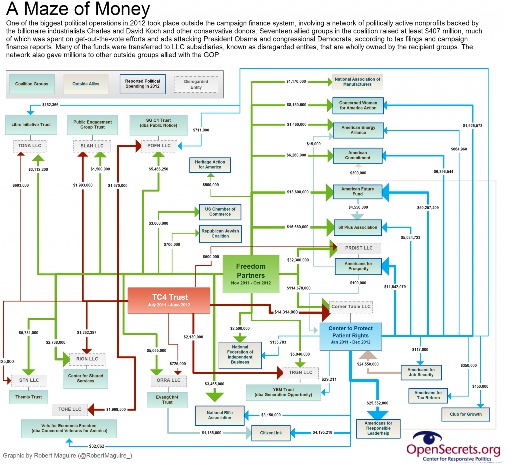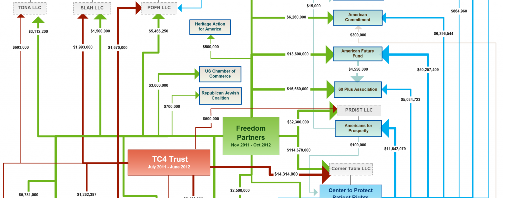- Facebook102
- Total 102
Kenneth Vogel reported recently in Politico that “[Charles] Koch and his brother David Koch have quietly assembled, piece by piece, a privatized political and policy advocacy operation like no other in American history that today includes hundreds of donors and employs 1,200 full-time, year-round staffers in 107 offices nationwide. That’s about 3½ times as many employees as the Republican National Committee and its congressional campaign arms had on their main payrolls last month.” Vogel adds that the Koch network will spend more than twice what the RNC spent in 2012, that it has more staff and funding in some key states than the state’s Republican party has, and that it is the leading provider of voter data and political training/coaching on the right today, supplanting the GOP.
Vogel and some of his quoted sources emphasize that this network is unprecedented in US history, which seems true. I would add that it appears unique in the world. The Varieties of Democracy (V-Dem) Project offers free data on the political systems of 173 countries. They ask so many questions about each country that the dataset includes 15 million data points. (I am one of many coders for the USA.) The V-Dem project asks about all kinds of ways in which political parties may be strong or weak; autonomous or co-opted; free, regulated or banned–but it doesn’t even pose questions about entities that perform the traditional functions of parties without being parties. That seems to be a novel contribution of the US since 2000.
The Koch network stands for an ideology and policies that I mostly disagree with, but that’s not the only reason to worry about this development–which could be replicated on the left. These are the main reasons:
- A standard political party is at least somewhat accountable, representative, and deliberative. Here are the extensive Rules of the Republican Party, which are mostly about intra-party elections, offices, procedures, and powers. They create a system in which each grassroots Republican has an independent voice and influence. To be sure, some parties have boasted of their authoritarian internal structures, but they have never been important in the US. More common are parties that fail to live up to their claims of responsiveness. In fact, Robert Michels’ “Iron Law of Oligarchy” (1911) was about the rigid tendency of even social-democratic parties to become internal oligarchies. That is a real worry, but there are limits to it. In competitive systems, parties that present themselves as democratic yet act oligarchically lose members and elections. Party elites are disciplined by voters–imperfectly but inevitably. There is no such mechanism within the Koch brothers’ network. It is officially and thoroughly oligarchical. The 1,200 paid staffers work for the people who pay them, not for voters or members.
- A party is also accountable to all the voters because it can obtain power and actually govern, and then the electorate can decide what they think of the results. But the Koch network doesn’t directly govern; it just influences some of the people who do. If the politicians they support turn out to be unpopular, the Koch network can pick new candidates for the next round. It cannot itself be voted out.
- A standard political party must be transparent if it seeks to attract and retain members. That’s why the GOP has published rules, leaders, and a platform. I am fully aware of the secrecy in US politics, but secrecy is checked by the need to compete for public support. As far as I can tell, the Koch network doesn’t even have an official name, let alone a set of binding rules that an outsider can assess, let alone a public budget.
- A standard political party includes both activists and interest groups and actual office-holders. The office-holders are responsible for performance in government and can’t just spout rhetoric. The activists, on the other hand, have some freedom to speak truth to power. The result is a healthy tension between aspirations and reality. But the Koch network is run by activists/interests groups who influence office-holders. It has no incentive to compromise or to support compromise.
- Power within the Koch network is proportional to money and is extraordinarily unequal. Michels taught that all parties are inequitable, even those most passionately committed to equality. Still, parties need citizens to vote and volunteer, and the capacity to do so is pretty evenly distributed across the population. The Koch network is purely and simply driven by money.
Below is the Koch network as depicted by my friends at the Center for Responsive Politics. It does not belong in a civics textbook, although a realistic textbook today should probably include it.
.
